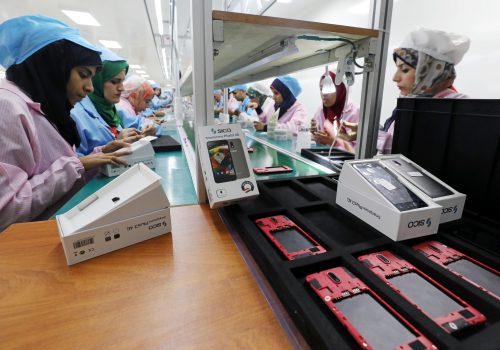Family businesses in the Gulf must not be left behind
From Fortune 500 companies to local mom-and-pop stores, family businesses represent a significant global economic force. According to the Family Firm Institute, family enterprises constitute around two-thirds of all businesses around the world, generate approximately 70 to 90 percent of annual global GDP, and create 50 to 80 percent of jobs in the majority of countries worldwide.
In the United States, one-third of S&P 500 firms are defined as family businesses, accounting for 89 percent of total tax revenue, 64 percent of GDP, and employing 62 percent of the nation’s total workforce. According to the United Kingdom’s (UK) Institute for Family Business, family-owned companies employ 13.4 million people, represent 85 percent of UK businesses, and generate 28 percent of the country’s GDP.
Despite considerable differences in economic drivers and market realities, family-owned firms also excel in fast-growth economies, such as the Gulf Cooperation Council (GCC) countries. The influence of family firms in the Middle East and North Africa and the GCC hasn’t been as widely studied as other regions. However, research suggests that family-owned businesses contribute about 60 percent of the gross domestic product in the GCC and employ more than 80 percent of its labor force. Moreover, it is estimated that 90 percent of the private sector in the United Arab Emirates (UAE) and Saudi Arabia consists of family-owned businesses.
However, the future for family firms is challenging and complex. GCC governments are grappling with lower oil revenues and higher debts, and the drive for economic diversification and growth is heightened by the need to create millions of jobs in the coming decade. These pressures are forcing economies to liberalize to create a more diverse private sector with increasing competition.
Additionally, the digitalization of GCC economies has not played to the strengths of certain family firms, especially those that are primarily in asset-heavy sectors, such as real estate, construction, retail, and trade. Moreover, as corruption and bureaucracy decline, the old wasta—or cronyism system—may come under significant pressure and level the playing field for regional and international competitors.
Considering the significant contribution to economic growth and stability by family-owned enterprises, support for family firms as they face the new economic landscape should be viewed as a strategic pillar in driving economic diversification and growth in the GCC and the wider Middle East. The disruption of some of the more traditional firms could be a positive step if they are supported in their transition, and if there is an emphasis on growth-hungry family-owned small-to-medium enterprises (SMEs). This could help contribute to the overall goals of economic policymakers so long as steps are taken to ensure family firms can continue to be engines of economic growth.
Family firms and economic growth in the GCC
As key economic actors, family firms have a direct and important impact on the economy and society. They are job creators. They build ecosystems through their supply chains and contribute to their communities through philanthropy. In many cases, family firms have been instrumental in the founding of the economic structures and pillars of their countries.
Certain family firms benefitted from close ties to the ruling class and enjoyed largess from government spending, specifically on large megaprojects that built GCC cities in the last several decades. As economies expanded, family firms leveraged their wealth and access to exploit opportunities to expand, becoming sprawling conglomerates and making it harder for others to compete.
Family business leaders are often characterized as long-term strategists: they are investors with a generational rather than short-term vision. Research shows that corporate entities run and operated by families are guided by a different purpose than their non-family-owned counterparts. These owners typically see their business as an integral part of the local economy and an important contributor to the community, not just a vehicle to enrich themselves and their shareholders.
The coronavirus pandemic, in particular, revealed to the world how family firms respond to a crisis, going above and beyond to secure business continuity and ensure the safety of employees and the engagement of stakeholders to find common solutions.
A challenging reality
Despite their many strengths and positive impacts, family business owners are facing an increasingly complex reality, especially given the dramatic shifts the world has experienced in the wake of the COVID-19 pandemic. Although research is scarce, the available data suggests that a family business’ average lifespan in the region is only twenty-three years, compared to the forty or fifty for today’s multinational, Fortune 500 companies. That is a long way off many of the world’s oldest family firms—some in existence for longer than one thousand years in countries such as Japan.
Family conflicts, succession challenges, and generational divides are just a few of the obstacles family firms will continue to confront as they forge a path through an uncertain future. Another critical factor in the longevity of local firms is inheritance, which splinters the wealth amongst a large base of family members, complicating succession.
Family firms in the GCC now entering their third or fourth generation are also facing a very different economic landscape than their founders. Regional governments are desperate to diversify their economies and drive foreign direct investment. The fourth industrial revolution has challenged the status quo of many, if not all, traditional industries. We are already witnessing the impact of technological disruption on family businesses and we are only in the early stages of digitalization.
Additionally, they must compete for talent that is increasingly mobile and possesses a wider array of options, including entrepreneurship. Family-owned businesses will also face a democratization of capital through more robust capital markets, with equity and debt markets becoming more liquid. Governments across the GCC are working on financing solutions for startups and SMEs to invigorate the private sector. They are also reducing friction for public market listings to allow more companies to access capital through initial public offerings. Credit will also become more ubiquitous as banks, funds, and fintech companies provide more flexible and cost-effective credit to startups and SMEs. All these factors are leading to more open and competitive markets.
The next generation of leaders now need to figure out how to transform their companies into agile, tech-savvy, future-proof organizations able to capitalize on the realities of the twenty-first century economy. And it is not just the world that is changing: families are too. Families are expanding in size, prompting a recent study to conclude that the average GCC family business would have to grow at an approximate rate of 18 percent a year to maintain the same level of wealth. If tomorrow’s family business leaders are to achieve this, they will have to ensure their companies can compete at a global level, innovate at a rapid pace, and embrace the diverse, inclusive leadership necessary to navigate the complex issues that will no doubt continue to emerge in this decade and the ones that follow.
The future of the GCC family firm
Despite the significant role family businesses play in generating employment and economic activity, governments are not doing enough to support them. As GCC economies transition to become more agile and less dependent on oil revenues, one focus area should support the transformation of family firms.
Given that family groups represent the largest corporate base in the GCC, the following steps should be taken to ensure that they are part of the economic transformation:
- Establish a joint taskforce of government, business leaders, and academics to better understand the challenges and the support required to ensure family businesses transition effectively and participate more meaningfully in the strategic sectors of the future.
- Educate family firms on the future of the economy, the financial markets, and government investment plans.
- Provide grants and incentives to support corporate innovation, research, and development.
- Issue low-cost financing for new ventures, startup investments, and international joint ventures.
- Incentivize partnerships with startups and SMEs.
- Subsidize corporate education and training programs.
- Reward strong corporate governance, inclusive and diverse leadership, and women’s participation at all company levels (board, leadership, and employee).
Strong, growing, and well-governed family firms can contribute to the economic diversification and growth goals of GCC countries. However, action is needed to support the successful transition and acceleration of many family firms. As the greatest transference of generational wealth continues to create both obstacles and opportunities for families and their enterprises, the GCC is similarly undergoing a transformation driven by the forces of low oil prices, new technologies, and the large and growing size of the youth population. For all these reasons, the economic well-being of the GCC and its family firms is inextricably connected.
Amjad Ahmad is director and resident senior fellow of empowerME at the Atlantic Council’s Rafik Hariri Center for the Middle East. Follow him on Twitter: @AmjadAhmadVC.
Farida F. El Agamy is an entrepreneur, lawyer and the general manager of the Tharawat Family Business Forum. Follow her on Twitter:@elagamy_f.
Image: People walk in front of a gold shop in Gold Souq in Abu Dhabi, United Arab Emirates, December 24, 2018. Picture taken December 24, 2018. REUTERS/Hamad I Mohammed


